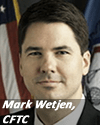A top regulator at the US derivatives watchdog has called for the establishment of a foreign regime for the execution and clearing of off-exchange derivatives to mitigate the global market from fragmenting.
Mark Wetjen, a commissioner at the Commodity Futures Trading Commission (CFTC), became the latest high-profile regulator to criticise his agency’s swap trading rules which have resulted in foreign investors shying away from using US electronic venues known as swap execution facilities (SEFs).
Since the passing of the execution and clearing mandate for swaps in the U.S., data has shown that trading activity on these SEF platforms has been US centric, suggesting European and Asian investors are reluctant to trade in US dollar-denominated swaps. This has led to concerns over a rise in systemic risk.
He argued among the most urgent changes is the development of a regulatory regime for foreign SEFs, in which the CFTC should defer oversight of foreign platforms to home country regulators through substituted compliance.
In a speech delivered at summit on Tuesday, he said: “The CFTC should defer to home country regulators in those instances where foreign trading venues choose to facilitate trades solely between foreign persons.
“The embrace of a foreign SEF regime would be a useful step toward implementing the CFTC’s cross-border framework. It would also help prevent the unnecessary fragmentation of liquidity and risk than an outright rejection, or unreasonably strict conception of, substituted compliance would invite.”
His comments comes one week after fellow commissioner, Chris Giancarlo, said he will publish a white paper that will call for an alternative to the current US SEF framework.
Wetjen also said the agency should take a “careful look at the alleged information leakage resulting from post-trade affirmation services employed by SEFs.”
